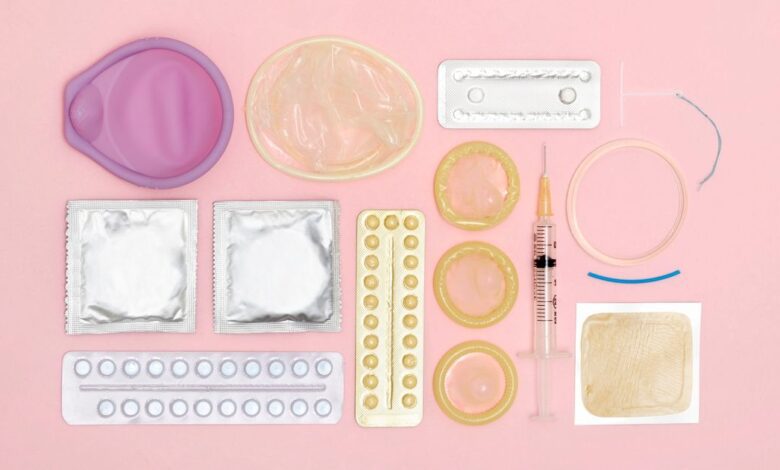Which Birth Control Kills Your Sex Drive The Least? Here’s The Answer.

It’s a common story for many women of reproductive age: They start a new contraceptive option, and their once-healthy sex drive takes a serious nosedive. Maybe you are one of them.
If you’ve ever wondered how you could go from craving sex multiple times per week, to actually never, know that the little pill or interuterine device is more powerful than you think. Low libido is a side effect of many forms of BC, and it comes down to how many birth control options prevent pregnancy by changing your body’s natural hormonal makeup.
How Birth Control Changes Your Sex Drive
If you choose a hormonal form of birth control, changes in sex drive are to be expected. Neurotransmitters responsible for mood ― including libido ― have hormone receptors that regulate when they’re released from the brain, says Dana Shanis, an obstetrician-gynecologist and co-founder of V Health and Wellness. Hormones from the pill can affect that process.
“Any change in hormone levels, such as taking a pill, can cause more or less release of those neurotransmitters – an effect that is highly dependent on the individual,” he said.
Some methods of birth control, such as the combination pill, are also known lower testosteronethe hormone that tends to increase sexual desire.
If you’re worried about this side effect, remember, a hormonal form of BC may not affect your libido, says Ashley Brant, an OB-GYN at the Cleveland Clinic.
“Most studies suggest that fewer than 5% of people on birth control experience a decrease in sex drive, meaning that most women who use contraception don’t notice a difference,” she said. “Some women even notice an improvement in their sex drive while using birth control. This may be because they are not worried about pregnancy.”
It’s hard to be sure who will experience a negative change in libido, but there are clues to consider. Alex Polyakov, clinical director at Melbourne IVF at the Royal Women’s Hospital, said it was common for some women to experience higher and lower sex drive throughout the month as their menstrual cycle progressed, while others felt no changes at all. hormonal.
“Women who experience these changes [in sex drive already] in response to hormonal variation it may be easier to experience more noticeable changes once they start taking oral contraceptives, compared to women who do not observe these changes in the course of a menstrual cycle,” he said.
Cavan Photos via Getty Images
Which BC Options Reduce Libido?
Taking any type of hormonal contraceptive ― the pill (combo or mini), the patch, the ring, the shot, the implant, the hormonal IUD ― can change your sex drive, although some may there is a greater risk of doing so than others, Polyakov said. Some may be lower risk because they contain fewer hormones or have less of a hormonal effect on your regular cycle.
For example, an IUD that contains progesterone may have a lower effect on sex drive “because the amount of hormone absorbed is less” compared to the pill, he explained. “These devices also do not normally prevent ovulation, and therefore the body’s normal hormonal environment is maintained.”
The mini pill only contains progestin, and there is some evidence it may have less of an effect on sex drive than the combination pill, but more research needs to be done.
If you don’t want to mess with hormones, you still have options.
“The only guaranteed way to avoid hormone-related side effects is to choose a hormone-free method of birth control,” says Brant. “These include the copper IUD, condoms, diaphragms, spermicides and abstinence. Other than the IUD, non-hormonal methods are less effective, so use with caution.
But as Polyakov stresses, sex drive is “very complex.” Although your libido requires “some degree of hormonal regulation,” it’s largely psychological.
“For example, if you put in a copper IUD, cramps and increased bleeding can make you less likely to want to have sex. If you’re on a BC option with lower efficiency, like a condom, you may less like sex, as well,” she says.
Past trauma, as well as other mental health issues, can also play a role. Your sex drive can also be altered by medications such as antidepressants. It’s important to keep all of those factors in mind above your preferred BC method.
Finding the Right Birth Control Takes Trial and Error
Note: If you test a birth control method, and find that it interferes with your desire in undesirable ways, you can stop what you are doing. Every expert notes that you may need to try several different types of birth control before you find one that doesn’t affect your sex drive (and doesn’t have other life-threatening side effects, like migraines).
Shanis says it will likely take a few weeks for “neurotransmitter changes to return to normal” if your sex drive is reduced — especially if you’ve been taking a certain type of BC, like the pill, for a while moment
“Since a pill can also affect blood flow to the vagina and clitoris, the process of arousal and ability to orgasm is sometimes affected as well,” he said. “Blood flow returns usually within two weeks.”
If you are sexually active, and thus improve arousal and orgasm, that can often help restore libido even more. Additionally, masturbation can “speed up the return of your sex drive,” says Shanis.
It’s also wise to bring your partner into your birth control discussions, says Polyakov. If you feel like your desire is decreasing, talk to them about other ways you can increase it in the bedroom. Open lines of communication about what you’re going through can also help create more intimacy, which can also help your sex drive.





